Winter Safety for Older Adults
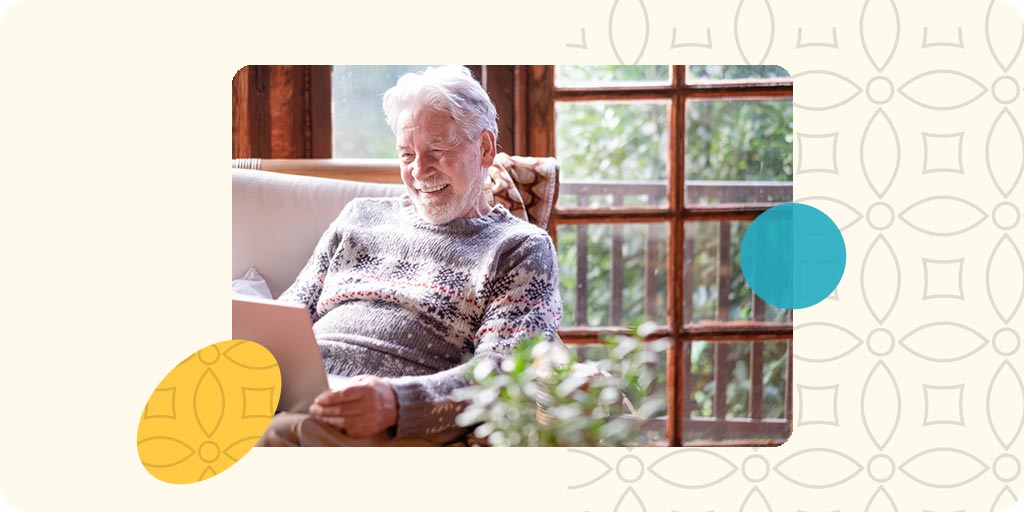
Table of Contents
- Health Conditions and Winter Weather
- Winter Safety Tips
- How to Winterproof a Home
- How to Stay Active in the Winter
Older adults are at a higher risk for health problems and injuries as the temperatures drop. In Maryland, the colder temperatures can be hazardous, potentially leading to frostbite, slips on ice or hypothermia. For older adults, any of these incidents can quickly become serious. You can take a few precautions to ensure a loved one’s safety and happiness. Continue reading for wellness tips, exercises and ways older adults can combat loneliness in the winter.
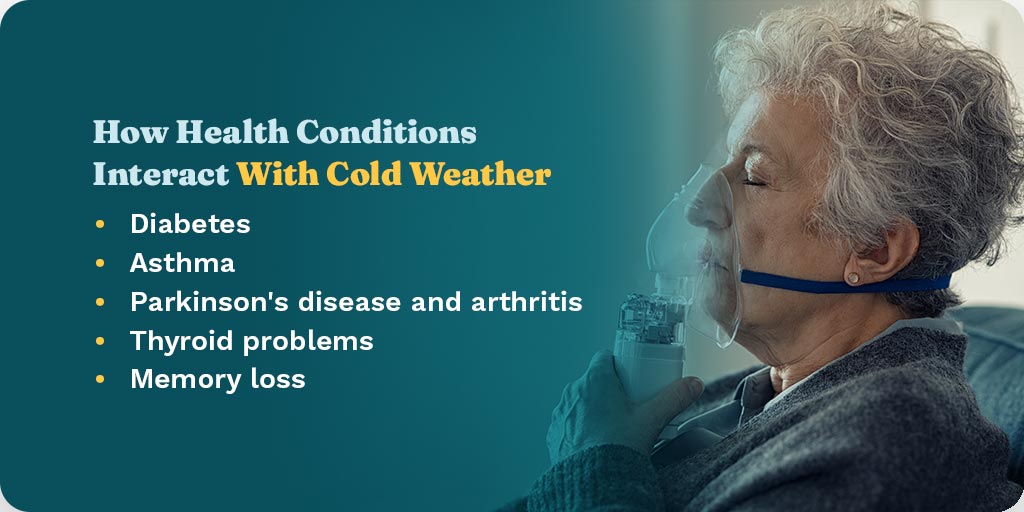
How Health Conditions Interact With Cold Weather
Everyone deserves to have security throughout the winter. Still, some health conditions can make it dangerous for older adults to be in cold weather, causing their bodies to work harder to stay warm. Be mindful of how the following health conditions interact with the cold.
- Diabetes: Colder temperatures make managing blood glucose levels challenging. The weather can keep blood from flowing normally to provide warmth.
- Asthma: People with asthma experience shortness of breath or wheezing that can intensify in cold weather as their airways become constricted.
- Parkinson’s disease and arthritis: Parkinson’s disease and arthritis can come with mobility challenges, making it more difficult for older adults to dress warmly, use blankets or go indoors.
- Thyroid problems: Thyroid problems can slow metabolism and cause the core body temperature to drop. As a result, people with thyroid problems may have a low tolerance for the cold and have difficulties maintaining normal body temperature.
- Memory loss: Memory challenges can cause a person to go outside without suitable clothing or emergency supplies, such as a cellphone or cane.
Consult with a health care provider to prevent any health-related challenges in the winter months. Physicians can ensure older adults take their medications regularly and note expired drugs. They can also recommend ways to avoid hypothermia and keep warm in the winter.
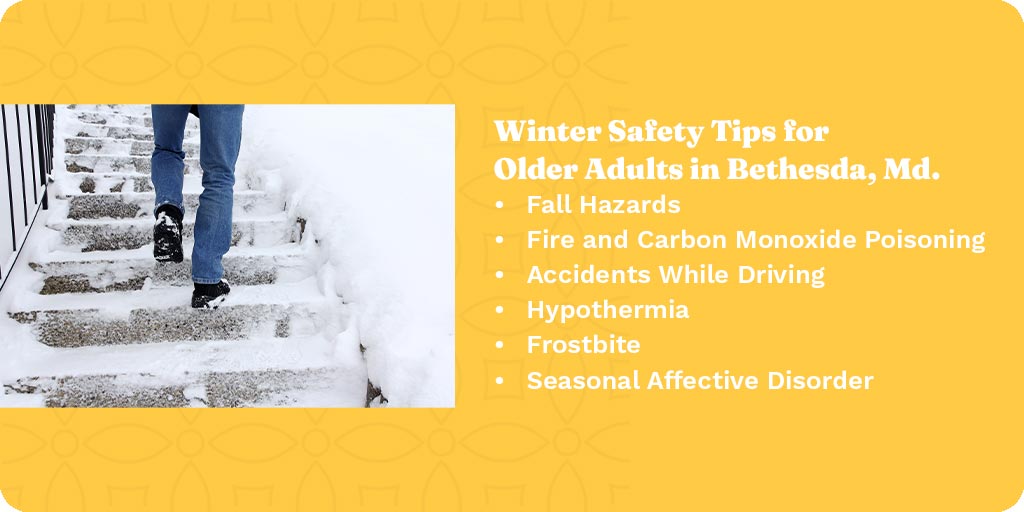
Winter Safety Tips for Older Adults in Bethesda, Md.
Ice, snow and cold temperatures can lead to slippery sidewalks, and cold weather can increase the risk of illnesses and injuries, especially among the aging population.
Here are a few winter safety risks and precautions you can take to keep an older friend or family member safe.
Fall Hazards
Falls are the leading cause of nonfatal and fatal injuries among older adults. With snow and ice building up in the winter, simple activities like walking to the car or mailbox can become treacherous. Fortunately, they can take several precautions to avoid slipping and falling on ice:
- Ensure steps and walkways are clear before walking.
- Wear boots with non-skid soles.
- Use canes with attachments that can provide traction in the snow.
- Hire someone to clear away snow and salt walkways around the home.
- Schedule home deliveries for groceries or prescriptions to avoid going outside in icy conditions.
Fire and Carbon Monoxide Poisoning
During the winter, many people rely on fireplaces or other heating sources like natural gas and kerosene. However, fireplaces and gas appliances can leak dangerous amounts of carbon monoxide — a deadly gas you cannot see or smell. These appliances can also be fire hazards. Warning signs of carbon monoxide poisoning include headache, nausea or vomiting, weakness, confusion or blurred vision.
To keep friends and family members safe, take the following precautions:
- Call an inspector to ensure all appliances are safe, including chimneys and flues.
- Open a window when using a kerosene stove.
- Be sure smoke detectors are in good working condition.
- Exercise caution with space heaters — do not leave them running unattended.
- Make sure space heaters are at least three feet away from anything flammable.
- Keep a functioning fire extinguisher in the house.
- Never use appliances like gas stoves or charcoal grills for home heating.
If you believe someone you know has carbon monoxide poisoning, get them into fresh air and call for medical care immediately.
Accidents While Driving
Older adults get in more vehicle accidents per mile than any other demographic. Unpredictable weather conditions and sometimes hidden road barriers can increase the chances of an accident. Ensure your friend or family member prepares their car for winter with antifreeze and a heating and cooling inspection.
If they must travel in winter conditions, ensure they have the following supplies in their car:
- First-aid kit
- Cellphone
- Windshield scraper
- Booster cables
- Blankets
- Shovel
- Flashlight
- Extra clothes
- Rock salt
- Water
- Canned or dried foods
Having the above supplies can keep them prepared to handle an emergency.
Hypothermia
As we grow older, we lose body heat much faster than when we were young. Older adults often produce less body heat and experience changes that make it more challenging to be aware of getting cold. As a result, winter temperatures can become dangerous before an older person even knows what is happening.
If body temperatures drop too low, hypothermia can set in. Older adults have an increased risk of hypothermia, which can occur when exposed to freezing temperatures for an extended time. Warning signs of hypothermia include:
- Cold, pale and ashy skin
- Feeling weak, tired and confused
- Problems walking
- Anger or confusion
- Puffy or swollen face
- Slowed breathing or heart rate
- Slower-than-usual speech
- Losing consciousness
To stay warm as an older adult in Bethesda, Md., take the following precautions:
- Stay indoors in frigid temperatures.
- If you must venture outdoors, dress warmly and don’t stay out for too long.
- Keep indoor temperatures at 68 degrees Fahrenheit or warmer.
- Stay dry, since wet clothing can cause the body to lose heat faster.
- Wear a waterproof jacket or coat.
- Wear layers of loose-fitting clothing.
- Wear hats, gloves, a winter coat, boots and a scarf to cover your mouth and nose outdoors.
Living in a cold house, apartment or an assisted living center can also cause hypothermia. Pay close attention to the inside temperature and ensure your friend or family member wears plenty of warm clothes if they live alone.
Frostbite
Frostbite is a condition caused by freezing temperature damage to the skin. Common areas for frostbite include the nose, ears, chin, cheeks, fingers and toes. Severe frostbite can result in a loss of limbs. Older adults with heart disease or circulation problems are at an increased risk.
Cover all body parts when venturing outdoors to prevent frostbite in the winter. If you notice red or dark skin that hurts, ensure your friend or family member goes back inside right away. Other signs of frostbite include:
- White, ashy or gray-yellow skin
- Hard or waxy skin
- Numbness
If you notice that someone has frostbite, run the affected area under warm water and call for emergency medical help.
Seasonal Affective Disorder
Older adults are at risk of depression and can be especially susceptible to it in the colder months. Because it can be challenging and risky to travel, many older adults have less contact with friends or family, which can lead to feelings of isolation and loneliness. Seasonal affective disorder occurs when a person has a lower mood in the fall and winter as the days get shorter.
Watch for signs of seasonal depression, such as:
- Mood swings and sudden behavioral changes
- Loss of interest in hobbies
- Withdrawal from social activities
- Changes in sleep patterns, weight, appetite or hygiene
If you notice signs of seasonal depression as an older adult in Bethesda, Md., consult with a health care provider or mental health professional. They may help determine whether your symptoms meet the criteria for SAD and provide counseling or medication to treat symptoms. Family members can check in on older adults or hire caregivers to provide companionship throughout the winter. A daily phone call can also improve their mental health by combating loneliness.
Should I Shovel Snow as an Older Adult in Bethesda, Md.?
As the snow and ice build up, older adults often wonder whether they should shovel their homes or hire a service. The answer to the question will depend on a few factors. In colder temperatures, the heart works overtime to move blood in the body and keep us warm. Activities like shoveling snow can put too much strain on the heart, especially on those who have heart disease. Shoveling can also be dangerous for people with balance problems or osteoporosis.
Older adults should consult a health care provider about whether shoveling and other outdoor winter tasks are safe for them. If they decide to shovel, it’s essential to take the above precautions to prevent falling, hypothermia, frostbite or health complications.
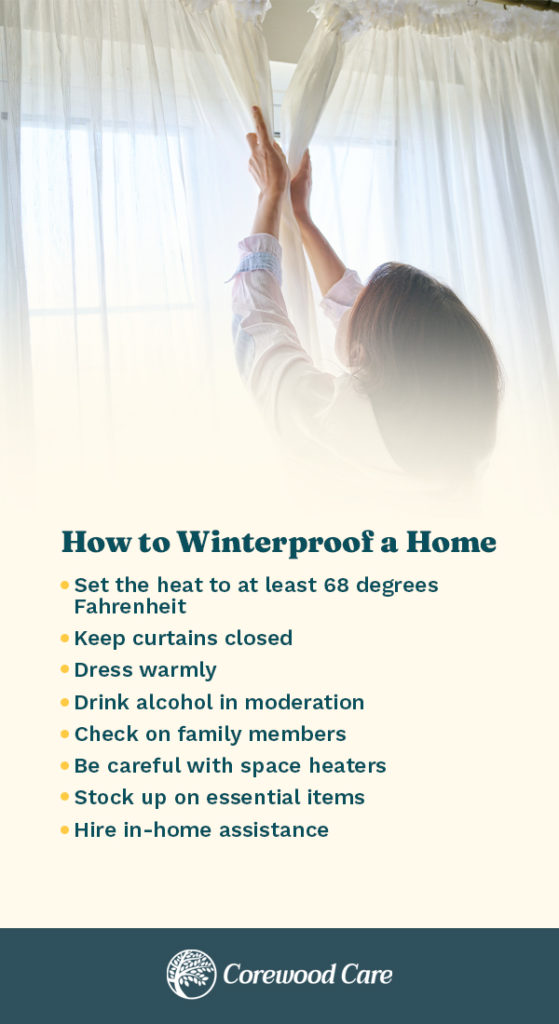
How to Winterproof a Home
To winterproof a home, follow these instructions.
- Set the heat to at least 68 degrees Fahrenheit: To prevent hypothermia, you should set your family member’s indoor temperature at 68 degrees Fahrenheit or warmer. You can help save on heating bills by closing doors to unused rooms. You can also place a rolled towel in front of each door to keep out drafts.
- Keep curtains closed: Ensure the house isn’t losing heat through the windows. Keep curtains and blinds closed and apply weatherstripping or caulk to keep the cold air out in the winter.
- Dress warmly: Blankets, socks and slippers come in handy in the colder months. Older adults should dress warmly indoors and layer up when leaving the house.
- Drink alcohol in moderation: Alcoholic drinks can make you lose body heat, so it’s best to avoid or limit alcohol consumption.
- Check on family members: Remember to check up on older adults in the cold weather. Try to stay with them if a power outage leaves them without heat.
- Be careful with space heaters: While it can be tempting to warm a room with a space heater, remember that some can be a fire hazard or lead to carbon monoxide poisoning.
- Stock up on essential items: Older adults should stock up on basic supplies like nonperishable food and water in case severe weather makes it dangerous to leave home for a few days. Keep flashlights and batteries at the ready as well.
- Hire in-home assistance: While many older adults care for themselves, others require in-home care services. Arrange these services for someone close to you during weather emergencies and to help them through the winter season. Professional caregivers can help with general tasks that are often more difficult with treacherous roadways or without electricity.
Following the above steps can ensure someone close to you is safe and cozy throughout the winter.
How to Stay Active in the Winter in Bethesda, Md.
Exercise is vital for people of all ages, especially older adults. Staying active can reduce their risk of chronic health conditions and improve strength, mood and balance to prevent injuries or seasonal depression in the winter. To get moving and stay healthy amid challenges posed by the winter, follow these tips.
- Use library resources: An easy way to maintain physical activity is to use resources available at the public library. Many libraries provide access to exercise videos and books that focus on safe, low-impact movements for older adults.
- Do virtual workout classes: Older adults can attend a virtual fitness class instead of venturing outdoors in treacherous conditions. Look for local fitness clubs and other resources for older adults that provide virtual classes or one-on-one training.
- Follow online videos: Search for exercise programs specifically for older adults that include activities like stretching, strength training and low-impact cardio.
- Incorporate movement in the day: While weather conditions might be dangerous, that doesn’t mean older adults can’t get up and move indoors. Have your older family member schedule activities into their days, such as marching in place during a favorite show’s commercial break or doing squats while making lunch.
Talk to a health care provider before participating in the following exercises. Older adults with a history or falls, heart disease or vertigo should find the activities right for them. Here are some examples of exercises they might incorporate into their winter routine.
- Endurance: These types of exercises increase breathing and heart rate. Examples include climbing stairs, dancing or brisk walking.
- Strength: Strong muscles can help older adults stay independent and complete everyday tasks much more easily. Examples include using resistance bands or lifting weights.
- Balance: These activities can reduce an older adult’s risk of falls. Examples include standing on one foot and then the other, marching in place or doing yoga positions like the tree pose.
- Flexibility: Any exercises that incorporate stretching and flexibility can increase a person’s range of motion and make daily tasks easier. Chair yoga is an excellent way for older adults to maintain flexibility.
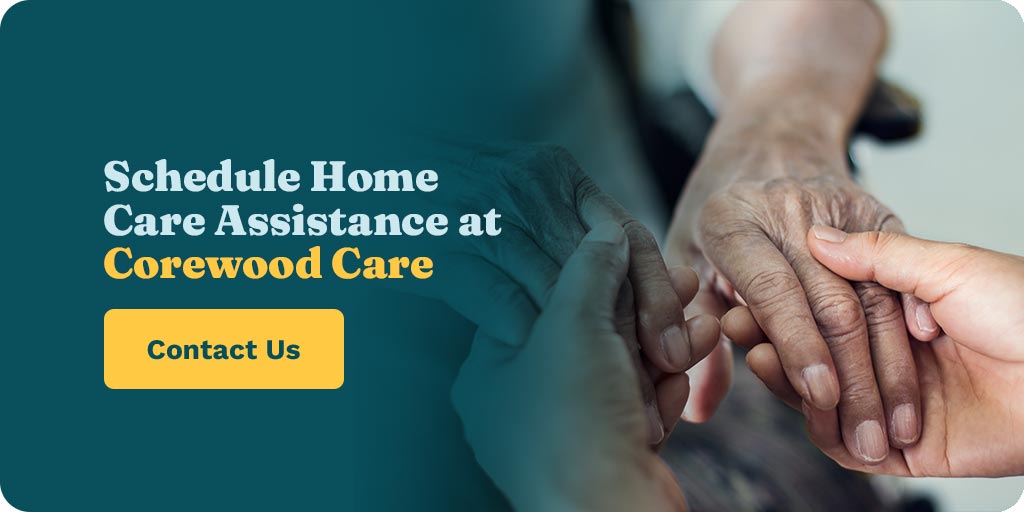
Schedule Home Care Assistance at Corewood Care
From hypothermia and fall-related injuries to seasonal affective disorder, the winter can come with several challenges for older adults. If you have an older adult in your life who you care about, consider home care assistance services from Corewood Care. We offer services throughout the metropolitan Washington, D.C., area, providing companionship and personal care services and ensuring safe transportation during the winter.
Our compassionate caregivers can also provide light housekeeping to prevent falls in the home, ensure daily nutrition and encourage physical activity. We also offer social and emotional support for your loved one when you can’t be with them. To learn more about our services, contact us today.



